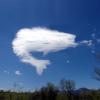Love the "Here Kitty, Kitty...". That comparison was never lost on me! :))
Interesting take on the subject. Once upon a time I adhered to that 'never touch the line' thing, -no let me say this right: "NEVER TOUCH THE LINE!!" :)) This was bc I'd lost fish that way -once upon a time.
I blamed it on the "short line thing", the loss of stretch that can give, at the hook point, to a fish's weight or exertions. But I came to realize this was most an issue with small hooks, and esp small short-shanked hooks, and esp up-eye hooks! In that last case, "DON"T TOUCH THE LINE!!" In fact, lose those short-shank up-eyed hooks altogether, or snell them! That's the way they were meant to be used in the first place.
And, of course, make sure your line can handle the weight of the fish! This seemingly obvious one I mention bc of the following painful episode that's still fresh in my mind: While visiting family near Erie, PA, I watched a man on a Presque Isle pier try to lift a good 3lb smallie 6ft up the pier wall, with 4lb mono! Feeling the gravity of the situation (!), I thought, "No! no, no-no-no... Don't do it!!" But I kept my trap shut, and let him do his thing. I glanced around for the closest net to borrow, but the line snapped, and the bass was gone. The man then turned and cussed out his wife! Somehow I don't expect to see that between Glenn and Keri, for technical as well as civility reasons! But, who knows what gets edited out?! ? ?
More to the point, fish are essentially weightless when in the water, but touch terra firma and they instantly have weight! I've watched many a steelhead break off as anglers try to beach a fish.
I now will grab the line, without hesitation, even with a fish in the water. And gosh, I've never considered the loaded rod thing... I'll pay attention now as I land fish. I think... the rod is always pointed up and away, esp with longer and faster rods. But, I'm not sure that's always going to be the case. Something like that only has to go wrong once, for it to be significant.
I think we all learn not to pull at a snag, straight in! That's asking for serious trouble. Hopefully, we sense the building tension pointed right at us! Reminds me of the time, as a teenager, I lined up square to a cinder block with a .22 rifle. I almost pulled the trigger, but sensing the potential, I made one step left, and the bullet snipped the grass right next to my right leg.
I'm in a float tube, yak, or on the bank, a lot. On a larger boat, high enough off the water, I simply like a net with non-tangling mesh of some type. I've never been a 'flipper', except for small fish, that won't over-stress the rod (that's all about the rod angle), or let the fish beat about the floor of the boat (I'm a fan of that MLF rule, if not for the fish's health but the respect it shows).
I've not grabbed the line as you and Keri do however. Will consider it, and see if I can shed some of that remaining automatic bias I acquired -once upon a time.
If anything, I've come to... landing fish, and indeed fighting fish, is all about keeping smooth and appropriate (firm) tension on that hook -keeping them swimming, lulling them into submitting- however you choose to get them to hand.









